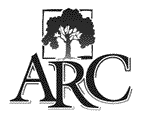 |
|
Michael L'Estrange
Computer
Information Science |
|
|
CISN 340 Cisco Networking Academy CCNA: Introduction to Networks
Note: (For students who do not read syllabi)
This syllabus is subject to change, changes will be announced during lecture, and all changes will probably only be reflected in the online course management system.
Online lectures may be prerecorded or scheduled and live streamed; however, attendance online is not mandatory, and students will have the option to view the recorded streamed lecture later.
Students are responsible for all information or announcements presented during lecture.
The preferred way to communicate with the instructor online, is through the messaging system within the course management system itself.
Fully online students who do not access the online course management site during the first 7 days of the course will be dropped having never attended the course.
A fully online student may be dropped if the student does not access the online course management site at least once every 7 days during the semester.
| Instructor: |
Michael L'Estrange |
| Instructor Email: |
lestram@arc.losrios.edu |
| Instructor Web Page: |
http://ic.arc.losrios.edu/~lestram |
| Instructor Phone: |
(916)-484-8147 |
| Instructor Office: |
ARC main campus, STEM 221 |
| Office hours: |
Note: Office hours may often be held in STEM 205
Mon 4:30-5:30pm
Tues 4:30-5:30pm and 7:00-8:00pm
Weds 4:30-5:30pm
Thurs 4:30-5:30pm
|
| Course Code #: |
12667
|
| Class Location: |
STEM 205 + Online |
| Meeting Times: |
Mon&Weds, 5:30pm-8:05pm |
| Semester: |
Fall 2024 |
| Term: |
Fall 2024 | First 8 weeks | 24 Aug 2024 - 16 Oct 2024 |
| First meeting: |
Monday 26 Aug 2024 |
| Final Examination: |
Monday 14 Oct 2024 |
| Prerequisite: |
None. |
| Advisory: |
CISC 350 (Introduction to Data Communications), CISC 361 (Information Technology Fundamentals), or CISN 110 (Networking Technologies - Preparation for N+ Certification) |
| Accepted for credit: |
None. |
| Hours: |
54 hours lecture, 27 hours laboratory, 108 hours out-of-class work, for a total of 189 student learning hours. |
| Units: |
3.5 |
Course Description
This course introduces data communication and networking fundamentals. It covers networking addressing, which includes calculations and conversions between binary, decimal, and hexadecimal numbering systems. It also surveys data communication hardware and software components and basic networking concepts. Topics include data communication, the Open Systems Interconnection (OSI) and Transmission Control Protocol and the Internet Protocol (TCP/IP) models, IP addressing and subnetting, routing concepts, LAN media, network configuration, troubleshooting, management, and analyses. This is the first course in preparation for the Cisco Certified Network Associate (CCNA) certification examination. American River College (ARC) is a certified Cisco Networking Academy and all courses are taught by Cisco Certified Academy Instructors (CCAI).
Student Learning Outcomes
Upon completion of this course, the student will
be able to:
- compare different types of networks.
- utilize the Cisco Internetworking Operating System (IOS).
- clarify the Open Systems Interconnection (OSI) reference model and the Transmission Control Protocol and Internet Protocol (TCP/IP) communication suite.
- identify the lowest layer of the OSI model and the physical medium.
- compare the differences between decimal, binary, and hexadecimal number systems and the essentials of IPv4, IPv6, and Ethernet MAC addressing.
- explain the data link layer that prepares network layer packets for transmission, controls access to the physical media, and transports data across various media.
- explore Ethernet functions, including how devices use Ethernet MAC addresses to communicate in a multiaccess network that has MAC address tables and forward Ethernet frames.
- exhibit the function of the network layer, routing, and the basic device that performs in the router that performs static and dynamic routing, packet forwarding, path determination, and data packets for both IPv4 and IPv6.
- differentiate the Ethernet MAC address and the ARP protocol for IPv4 address resolution and the Neighbor Discovery Protocol for IPv6.
- explain how to configure a Cisco router including IPv4 and IPv6 addresses on an interface.
- describe how to calculate and use subnet masks to determine the number of subnetworks and hosts in a network and examine how to improve network performance by optimally dividing the IPv4 address space based on network requirements.
- review IPv6 network addressing including representation, types, and structure.
- demonstrate Internet Control Message Protocol (ICMP) tools such as ping and trace.
- illustrate Transmission Control Protocol (TCP) and User Datagram Protocol (UDP) including segmentation, the three-way handshake, expectational acknowledgments, and data delivery.
- inspect protocols of the TCP/IP application layer related to the top three layers of the OSI model including communicating across data networks and key protocols and services including HTTP, HTTPS, DNS, DHCP, SMTP/POP, and FTP.
- explain network security threats and vulnerabilities such as network attacks, and mitigation techniques.
- reexamine the various components in a small network including network growth, configuration, troubleshooting issues, and troubleshooting methodologies.
Textbook and Supplies
This course uses online materials that will be provided free of charge to the student.
A student may purchase a printed text book in the college store at her or his option. The Cisco version 7 books are nearly identical to the online material:
Version 7 books
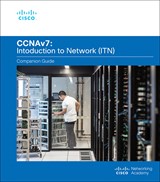
Introduction to Networks Companion Guide (CCNAv7)
Cisco Networking Academy, Cisco Press, © 2020,
ISBN 13: 978-0-13-663366-2
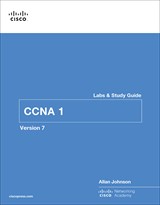
Introduction to Networks Labs and Study Guide (CCNAv7)
Cisco Networking Academy, Cisco Press, © 2020,
ISBN 13: 978-0-13-663445-4
Version 6 books
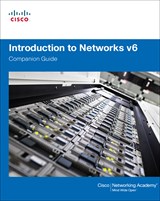
Introduction to Networks v6 Companion Guide
Cisco Networking Academy, Cisco Press, © 2016,
ISBN 13: 9781587133602
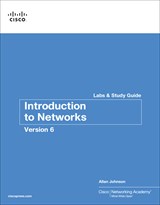
Introduction to Networks v6 Labs & Study Guide
Cisco Networking Academy, Cisco Press, © 2016,
ISBN 13: 9781587133619
Required:
- All students are required to maintain a Los Rios Gmail account.
- All students are required to maintain a Cisco Netacad.com learning managment system shell account.
- All students are required to maintain a NetLab+ shell account.
- All students are required to obtain a Sacramento Public Library card.
Presentation of Class Materials:
Course information will be introduced by means of lecture, classroom
demonstrations and labs. Students may be given assignments to
be completed both in class as well as on their own time. Lab
work with a Windows PC will be required, and can be completed on
campus.
Special note for the online semester for contacting the instructor
Please contact the instructor use the messaging system within the course in netacad.com.
Special note on contacting the instructor
The instructor is an offline resource, and he will probably not return
any messages over the weekend or college vacation days.
Emails that are undecipherable will be ignored. Use standard English in
all messages sent to the instructor.
Emails that do not contain a question may not be replied to. A question
should be denoted with a question mark, i.e.?!
Messages with long or complex questions may take time to answer, as in
several days.
The instructor will not open emails or attachments he cannot identify,
i.e. use your ARC Los Rios email account.
The instructor uses the lestram@arc.losrios.edu email address.
DO NOT use the Gmail address @apps.losrios.edu to contact the instructor.
Be aware, that when the instructor sends a group messages to all students enrolled in the course, the return address is sometimes the instructor's Gmail account, which is rarely checked.
No student emails are deleted.
Special instructions for emailing your instructor
All emails sent to the instructor should contain the following in the subject line: Course number, your name, and the subject.
Here is an outstanding example:
Subject: CISN 141 | L'Estrange | Summer class add number request
In order to properly and promptly answer emails, your instructor must be able to identify you and what class you are enrolled in. Your instructor teaches many different courses each semester, and sometimes a student may submit a question that will have different answers depending on the course, i.e. How to do things in Linux and Microsoft Windows will have very different answers.
You are required to change the subject line if you change the subject contents of an email.
Your instructor is NOT a double-click resource available 24/7. I shall not be answering emails on weekends. If you send a lengthy email not containing a single question mark, or any punctuation at all, I may never answer your email. If your email question requires research on my part, it may take 2-4 days to get to it. It would not be unusual for the email you sent on a Friday evening to not be answered until the next Wednesday.
Course Policies:
This class will adhere to as closely as possible all ARC and Los Rios
guidelines set forth in the catalog and/or the schedule of classes.
A document of general course policies for all my classes can be found
on the instructor's web site.
Online Labs
Almost all CIS classes require labs. It is the online student's
responsibility to complete the lab. Labs will be completed online using the North/Far North community college consortium's NDG Netlab+ labs. Netlab+ will be introduced during lecture.
Labs
Almost all CIS classes require labs. It is the online student's
responsibility to complete the lab. Students may complete lab
assignments in BCIS Area Computer Labs, room STEM 301, or at another ARC
computer lab facility if allowed.
Lab assignments must be completed by the assigned date. Under no
circumstances will network, system, hardware, or any other problems of
such nature be considered an excuse for turning in late work.
Lab hours/Assistance:
Students may utilize lab time and assistance on campus in the BCIS area
computer lab room STEM 301. Check
with the BCIS area lab personnel in room STEM 301 for availability. Lab
assistance is not tutoring. Tutoring is available on campus; contact
the instructor directly
regarding tutoring.
Special Note on Cheating
Independent Work Policy: Labs, Projects, Task, Assignments and Exams
are designed to measure the progress of individual
students. Collaborative work in groups of two or more is
prohibited unless the instructions specifically state otherwise.
A student must not copy another student’s work or import work from
another student. Do not allow another student to copy your
work. Your work must be independent - Failure to work independently
will result in all violators’ grades being reduced to zero for that
lab, project, task, assignment or exam. Second offence of this
policy will be referred to the Area Dean for administrative action.
Online Testing Privilege: Participation in online examinations
is a privilege. When a student submits a lab, project, task,
assignment, or exam that appears to violate the independent work
policy the instructor retains the right to revoke the online exam
privilege and direct the student to the American River College
Computer Science Lab STEM 301 for on-site testing.
Accommodations
It is critical that every student be provided an environment which
is conducive to learning. Please contact the professor if you have
any physical or learning disability or other need which might
require a special accommodation.
Special Software:
VMware Player, Linux, Packet Tracer, etc.
Completion of the exercises and projects required for this class requires access to a computer loaded with special software, such as the Linux operating system, virtual machine software, packet tracer, or other special software. To complete lab assignments, students may use the ARC CSIT Area Computer Lab, Room STEM 301. It is not necessary to purchase special software, as most of the software is free, open source, or provided at no cost to the student.
Online Discussions
During the semester you will have access to a course website. These websites allow for intraclass communication with other students through messages, online discussions or forums, etc. The instructor in general will not monitor these communications. However, abusive remarks or attacks against others will not be tolerated and will result in disciplinary actions taken by the instructor and/or college.
Attendance Policy
Attendance will be monitored.
As stated in LRCCD Regulation R-2222, a student may
be dropped from any class when that student's absences
exceed six percent (6%) of the total hours of class time.
Once a student has been dropped from
the class (for whatever reason), he or she will not be reinstated.
Drops: Students unable to complete the course are responsible for
notifying the Records Office of their withdrawal. Failure to
formally drop the course will result in a final grade of 'F'.
Online students will prove attendance by completing work or communication with the instructor using the online learning management course shell messaging system.
If you have extenuating circumstances
which prevent you from participating in the class or submitting your
assignments, CONTACT THE PROFESSOR IMMEDIATELY!
Course Lesson Plan / Schedule of Topics
The schedule of topics, chapters to be covered, and assignments due
each week shall be listed in the online learning managment system. Students may certainly read
ahead, but completion of assignments early may not be allowed or
even be possible. Changes to the details of this course schedule
will not be reflected on this web page. For online classes, please
refer to the LMS, for all current updates.
For in person classes, the instructor will make announcements during
lecture.
This below schedule is an example only; Refer to the online course management system for all assignment and due dates after the first day of class.
| CISN 340 Course Lesson Plan |
| Week |
Topics |
Assignment |
Week 1
Monday |
- Introduction to Cisco
- Certifications
- ARC Los Rios email
- Set up of Cisco Cisco Network Academy, netacad.com student accounts
- Introduction to Cisco Network Academy site
- Introduction to NDG Netlab+ site
- Computer Basics
- Binary
|
- Setup of Hard Disks
- Access ARC email
|
| Wednesday |
- Module 1 and 2 *Networking Today and Basic Switch and End Device Configuration.
- *The different types of networks and Cisco Internetworking Operating System (IOS).
- Moduel 3 *Protocols, Models, and Physical Layer.
- Exploring the Network
- Introduction to Networking
- Globally Connected
- Configuring a Network Operating System
- IOS Bootcamp
- LANs, WANs, and the Internet
- The Network as a Platform
- The Changing Network Environment
- Purpose of OSI
- TCP/IP model
|
- Read Online Curriculum Module 1, 2 and 3
- Complete PT and Lab Module 1, 2 and 3
|
Week 2
Monday |
Labor Day, campus closed
|
Labor Day, campus closed
|
| Wednesday |
- Module 4 Physical Layer *Transmission Control Protocol and Internet Protocol (TCP/IP) communication suite and the physical medium.
- Physical Layer Protocols
- Network Media
|
- Read Online Curriculum Module 4, 5 and 6
- Complete PT and Labs Module 4, 5 and 6
- Modules 1 - 3: Basic Network Connectivity and Communications Exam
|
Week 3
Monday |
- Moduel 5 and 6 *Number Systems and Data Link Layer.
- *Decimal, binary, and hexadecimal number systems and network layer packets for transmission, controls access to the physical media, and transports data across various media.
- Network Protocols and Communication
- Rules of Communication
- Network Protocols and Standards
- Moving Data in the Network
|
- Read Online Curriculum Module 7
- Complete PT and Labs Module 7
|
| Wednesday |
- Module 7 and 8 *Ethernet Switching and Network Layer.
- *Ethernet functions, network layer, routing, and the basic device that performs in the router packets for both IPv4 and IPv6.
- Network Access
- Data Link Layer Protocols
- Media Access Control
- LAN Switches
|
- Read Online Curriculum Module 8 and 9
- Complete PT and Labs Module 8 and 9
- Modules 4 - 7: Ethernet Concepts Exam
|
Week 4
Monday |
- Module 9 and 10 *Address Resolution and Basic Router Configuration.
- *ARP protocol resolution and configure a Cisco router including IPv4 and IPv6 addresses on an interface.
- Ethernet Protocol
- Address Resolution Protocol
- Routing
- Routers
- Configuring a Cisco Router
|
- Read Online Curriculum Module 10
- Complete PT and Labs Module 10
|
| Wednesday |
- Module 11 and 12 *IPv4 and IPv6 Addressing.
- *How to calculate and use subnet masks to determine the number of subnetworks and hosts in a network.
- Network Layer Protocols
- IP Addressing
- IPv4 Network Addresses
- IPv6 Network Addresses
- Connectivity Verification
- Subnetting IP Networks
- Subnetting an IPv4 Network
- Addressing Schemes
- Design Considerations for IPv6
|
- Read Online Curriculum Module 11
- Complete PT and Labs Module 11
- Modules 8 - 10: Communicating Between Networks Exam
|
Week 5
Monday |
- Module 13 and 14 *ICMP and Transport Layer.
- *Internet Control Message Protocol (ICMP) tools such as ping and trace. Transmission Control Protocol (TCP) and User Datagram Protocol (UDP) include segmentation, the three-way handshake, expectation acknowledgments, and data delivery.
- Transport Layer Protocols
- TCP and UDP
|
- Read Online Curriculum Module 12
- Complete PT and Labs Module 12
|
| Wednesday |
- Module 15 *Application Layer.
- *The protocols of the TCP/IP application layer are related to the top three layers of the OSI model including communicating across data networks, and key protocols and services including HTTP, HTTPS, DNS, DHCP, SMTP/POP, and FTP.
|
- Read Online Curriculum Module 13
- Complete PT and Labs Module 13
- Modules 11 - 13: IP Addressing Exam
|
Week 6
Monday |
- Module 16 *Network Security Fundamentals.
- *Network security threats and vulnerabilities such as network attacks, and mitigation techniques.
|
- Read Online Curriculum Module 14
- Complete PT and Labs Module 14
|
| Wednesday |
- Module 17 *Build a Small Network.
- *The various components in a small network include network growth, configuration, troubleshooting issues, and troubleshooting methodologies.
|
- Read Online Curriculum Module 15
- Complete PT and Labs Module 15
- Modules 14 - 15: Network Application Communications Exam
|
Week 7
Monday |
- Application Layer Protocols
- Well-Known Application Layer Protocols and Service
- The Message Heard Around the World
|
- Read Online Curriculum Module 16
- Complete PT and Labs Module 16
|
| Wednesday |
- It's a Network
- Create and Grow
- Keeping the Network Safe
- Basic Network Performance
- Managing IOS Configuration Files
- Integrated Routing Services
|
- Read Online Curriculum Module 17
- Complete PT and Labs Module 17
- Modules 16 - 17: Building and Securing a Small Network Exam
- All Online Curriculum Finished
- All Book Chapters Finished
- All Labs Completed
- Practice Final exam
- Practice PT Skills Assessment (PTSA)
|
Week 8
Monday |
- Final Review
- Review of OSI Model
- Review of LAN technologies, topologies, hardware, and protocols
|
- ITN Final Skills Exam (Equipment)
- Turn in Lab Manual
|
| Wednesday |
|
- Course Feedback Due
- Final Exam
- ITN Final Skills Exam (PTSA)
- NO Assignments accepted after the final
|
After the start of class, use only the schedule in the learning
managment system. Current Homework/Projects/Lab Assignments and
Discussion assignments and due dates will be specified in the
learning management system.
Documents turned-in:
When turning in work in hard copy or electronic form, please
include a header on the top of the page with the following
information:
Your Name Assignment #
CISN 340 Page # of #
Also, when contacting the instructor via email, be sure to include
the class number in the subject line, i.e. CISN 340.
Evaluation and Grading
The grade in this course will be determined by student
performance in each of the following areas, and weighted as
described in the following charts.
| Grade Assessment Weighting |
Module Exams
6 @ 25 points each |
(150 points) 30% |
| Labs / Lab book |
(125 points) 25% |
PT Practice Skills Assessment
|
(45 points) 9% |
| Pretest Exam / Practice Final Examination |
(30 points) 6% |
| Lab Practical equipment / PT Skills Exam |
(75 points) 15% |
| Final Examination |
(75 points) 15% |
| Grade Assignment by Total Points |
| Points Obtained |
Total % |
Grade
Assigned |
| 451+ |
90% |
A |
| 401+ |
80% |
B |
| 351+ |
70% |
C |
| 301+ |
60% |
D |
| less than 300 |
below 60% |
F |
Extra Credit Work
There will be no extra credit work given in this class. A student's grade
is based solely upon the
regularly assigned work in the class: homework, lab assignments, projects, quizzes, and examinations.
Grades Available Online
Grades will never be sent out by
email.
Most grades for individual assignments will be available during
the semester through the learning management system used for the
class.
At the end of the semester, final grades will only be accessible
through the ARC eServices system.
Be aware that the instructor does not have complete control over the total grade section of the gradebook in Canvas LMS, and unfortunately your total reported in Canvas might not be an up-to-date or accurate reflection of your current grade in the course.
Late Adds
Students who add the course after the first day are still responsible for content missed in lectures and or labs and other material or media. The instructor will not repeat a lecture for students who add late.
If the due date has passed for an assignment or exam, and the student missed the assignment because the student had not yet added the course, the student will not be allowed to makeup the assignment, and the student will start the course will a score of zero on the missed assignment or exams. If a late student does not agree with this policy, then the student should wait to take the course the following semester.
Policy on Late Work and Makeup Exams
Note for online exams: The Canvas online learning management system allows for due dates on assignment or exams. Unfortunately, the system will report an exam or assignment as 'not activated' after the due date has passed and the student can no longer take the exam.
No late work will be accepted.
No makeup quizzes or exams will be given.
NO Assignments accepted after the final
Caveat
The professor reserves the right to change any of the details of
this course syllabus or the course schedule with a minimum of
advance notice.
Passing the Course
- Students must take the Final exam to pass.
- Students must pass the Final exam with a D grade or better.
- Students must take the Final exam on the scheduled date and
time of the Final. (You have 8 weeks to clear you schedule -
make it so.)
Last Updated: 26 August 2024



